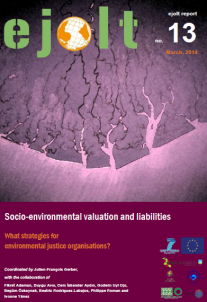
Ejolt report 13: Socio-environmental valuation and liabilities. What strategies for environmental justice organisations?
The report can be downloaded here.
Abstract
This EJOLT report focuses on two central issues: the use of evaluation methods and the notion of liabilities, as applied to socio-environmental conflicts and EJO campaigns. The report includes (i) one review chapter of extra-judicial cases having a valuation dimension, (ii) six case studies from four continents involving a close collaboration between activists and academics, and (iii) one practicaltheoretical synthesis. Each one of the case studies examines one or more of the following key questions: How are valuation conflicts to be dealt with? How can we evaluate a given ‘development project’? Is it possible to compensate for the liabilities involved? If yes, how? More specifically, two chapters are concerned with environmental impact assessments (oil exploitation in Nigeria and water megaproject in Brazil), two chapters tackle cost/benefit approaches and their limits (forest valuation in India and nuclear power plants in Bulgaria and Turkey), one deals with multicriteria evaluations (oil exploitation in Ecuador), and one analyses a conflict of valuation languages (gold mining in Turkey). Among these case studies, two (Nigeria and India) also discuss the compensatory mechanisms involved as well as their suitability.
When dealing with environmental decision-making or conflict resolution, the approach of standard economics (even when labelled ‘environmental’) is to use a common unit – a monetary numeraire – for all the different values and then to look for a trade-off between all of them within a market context. This approach assumes the existence of value commensurability. Ecological economists and activists, in contrast, acknowledge value incommensurability. They argue that it is misleading to reduce the diversity of languages of valuation (e.g., livelihood, identity, territorial rights, spirituality, aesthetics) to a single monetary measure that denies the legitimacy of other languages. Indeed, in virtually every socioenvironmental conflict, a variety of valuation languages is deployed. Their inclusion in evaluation processes is particularly important since governments and companies usually try to portray socio-environmental impacts solely as a technical problem that will be handled with the proper use of technology or monetary accounting. In fact, most of the case studies in this report show that lower-income sectors (especially indigenous people and peasants) do not simply seek a monetary compensation and do worry about local environmental matters. In many cases therefore, monetary compensation is likely not going to be sufficient to resolve disagreements.
More fundamentally, these valuation contests also highlight opposite visions and values about local development, between on one hand (lower-income) locals and on the other, the state and corporate sectors. In view of the differences in material interests, values and perceptions, it appears that the evolution of most socioenvironmental conflicts will very much depend on the extent to which different languages of valuation are acknowledged and addressed. Generally speaking, this would require, firstly, carrying out a rigorous socio-environmental impacts assessment of the region at stake, and secondly, undertaking an in-depth deliberative multicriteria evaluation.
Keywords: Valuation, Liabilities, Cost/Benefit Analysis, Environmental Impact Assessment, Languages of Valuation, Ecological Distribution Conflicts, Compensation, Legal Actions, Brazil, Yasuní, Niger Delta, India, Turkey, Bulgaria
Authors: Julien-François Gerber (REEDS-UVSQ) With the collaboration of: Fikret Adaman (BOG), Duygu Avcı (ISS), Cem İskender Aydın (BOG, REEDS-UVSQ), Godwin Uyi Ojo (ERA), Begüm Özkaynak (BOG), Beatriz Rodríguez-Labajos (ICTA-UAB), Philippe Roman (REEDS-UVSQ) and Ivonne Yánez (Accion Ecologica-OCMAL)

The project ENVJUSTICE has received funding from the European Research Council (ERC) under the European Union’s Horizon 2020 research and innovation programme (grant agreement No. 695446)